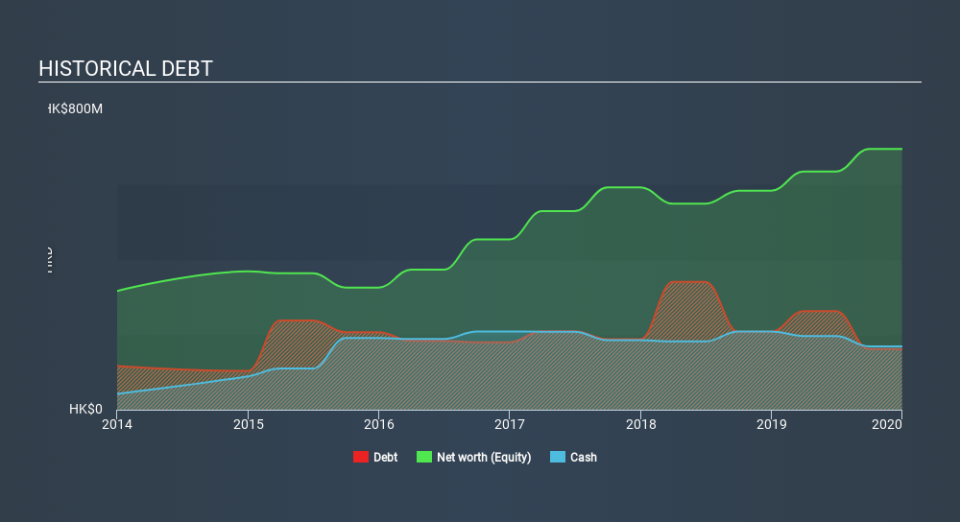Ten Pao Group Holdings (HKG:1979) Seems To Use Debt Quite Sensibly

Legendary fund manager Li Lu (who Charlie Munger backed) once said, 'The biggest investment risk is not the volatility of prices, but whether you will suffer a permanent loss of capital. It's only natural to consider a company's balance sheet when you examine how risky it is, since debt is often involved when a business collapses. We note that Ten Pao Group Holdings Limited (HKG:1979) does have debt on its balance sheet. But is this debt a concern to shareholders?
When Is Debt Dangerous?
Debt is a tool to help businesses grow, but if a business is incapable of paying off its lenders, then it exists at their mercy. Ultimately, if the company can't fulfill its legal obligations to repay debt, shareholders could walk away with nothing. However, a more usual (but still expensive) situation is where a company must dilute shareholders at a cheap share price simply to get debt under control. Of course, debt can be an important tool in businesses, particularly capital heavy businesses. The first step when considering a company's debt levels is to consider its cash and debt together.
See our latest analysis for Ten Pao Group Holdings
How Much Debt Does Ten Pao Group Holdings Carry?
As you can see below, Ten Pao Group Holdings had HK$161.8m of debt at December 2019, down from HK$207.6m a year prior. But on the other hand it also has HK$169.0m in cash, leading to a HK$7.16m net cash position.
How Healthy Is Ten Pao Group Holdings's Balance Sheet?
We can see from the most recent balance sheet that Ten Pao Group Holdings had liabilities of HK$1.39b falling due within a year, and liabilities of HK$134.5m due beyond that. Offsetting these obligations, it had cash of HK$169.0m as well as receivables valued at HK$843.0m due within 12 months. So it has liabilities totalling HK$507.8m more than its cash and near-term receivables, combined.
This is a mountain of leverage relative to its market capitalization of HK$730.3m. Should its lenders demand that it shore up the balance sheet, shareholders would likely face severe dilution. While it does have liabilities worth noting, Ten Pao Group Holdings also has more cash than debt, so we're pretty confident it can manage its debt safely.
Better yet, Ten Pao Group Holdings grew its EBIT by 162% last year, which is an impressive improvement. That boost will make it even easier to pay down debt going forward. When analysing debt levels, the balance sheet is the obvious place to start. But ultimately the future profitability of the business will decide if Ten Pao Group Holdings can strengthen its balance sheet over time. So if you want to see what the professionals think, you might find this free report on analyst profit forecasts to be interesting.
Finally, a company can only pay off debt with cold hard cash, not accounting profits. Ten Pao Group Holdings may have net cash on the balance sheet, but it is still interesting to look at how well the business converts its earnings before interest and tax (EBIT) to free cash flow, because that will influence both its need for, and its capacity to manage debt. Looking at the most recent three years, Ten Pao Group Holdings recorded free cash flow of 28% of its EBIT, which is weaker than we'd expect. That's not great, when it comes to paying down debt.
Summing up
While Ten Pao Group Holdings does have more liabilities than liquid assets, it also has net cash of HK$7.16m. And it impressed us with its EBIT growth of 162% over the last year. So we don't have any problem with Ten Pao Group Holdings's use of debt. The balance sheet is clearly the area to focus on when you are analysing debt. However, not all investment risk resides within the balance sheet - far from it. Case in point: We've spotted 3 warning signs for Ten Pao Group Holdings you should be aware of.
Of course, if you're the type of investor who prefers buying stocks without the burden of debt, then don't hesitate to discover our exclusive list of net cash growth stocks, today.
If you spot an error that warrants correction, please contact the editor at editorial-team@simplywallst.com. This article by Simply Wall St is general in nature. It does not constitute a recommendation to buy or sell any stock, and does not take account of your objectives, or your financial situation. Simply Wall St has no position in the stocks mentioned.
We aim to bring you long-term focused research analysis driven by fundamental data. Note that our analysis may not factor in the latest price-sensitive company announcements or qualitative material. Thank you for reading.

